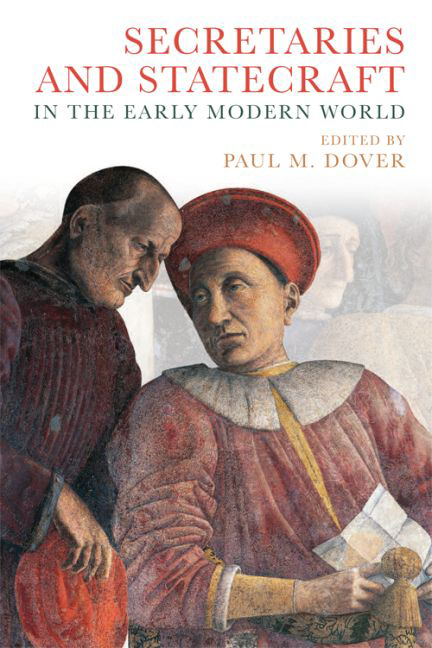Book contents
- Frontmatter
- Contents
- List of Contributors
- 1 Introduction: The Age of Secretaries
- 2 Records, Politics and Diplomacy: Secretaries and Chanceries in Renaissance Italy (1350–c. 1520)
- 3 Mercurino di Gattinara (1465–1530): Imperial Chancellor, Strategist of Empire
- 4 ‘This continuous writing’: The Paper Chancellery of Bernhard Cles
- 5 Parables and Dark Sentences: The Correspondence of Sir William Cecil and William Maitland (1559–73)
- 6 Axel Oxenstierna and Swedish Diplomacy in the Seventeenth Century
- 7 Statecraft and the Role of the Diplomat in Ducal Savoy: The Career of Alessandro Scaglia (1592–1641)
- 8 Richelieu, Mazarin and Italy (1635–59): Statesmanship in Context
- 9 The Learned Ideal of the Mughal Wazīr: The Life and Intellectual World of Prime Minister Afzal Khan Shirazi (d. 1639)
- 10 Reconsidering State and Constituency in Seventeenth-Century Safavid Iran: The Wax and Wane of the Munshi
- 11 Choreographers of Power: Grigorii Kotoshikhin, State Secretaries and the Muscovite Royal Wedding Ritual
- 12 Eberhard von Danckelman and Brandenburg's Foreign Policy (1688–97)
- 13 Chancellor of State: Prince Wenzel Anton Kaunitz, the Habsburg Foreign Office and Foreign Policy in the Era of Enlightened Absolutism
- Index
1 - Introduction: The Age of Secretaries
Published online by Cambridge University Press: 21 November 2017
- Frontmatter
- Contents
- List of Contributors
- 1 Introduction: The Age of Secretaries
- 2 Records, Politics and Diplomacy: Secretaries and Chanceries in Renaissance Italy (1350–c. 1520)
- 3 Mercurino di Gattinara (1465–1530): Imperial Chancellor, Strategist of Empire
- 4 ‘This continuous writing’: The Paper Chancellery of Bernhard Cles
- 5 Parables and Dark Sentences: The Correspondence of Sir William Cecil and William Maitland (1559–73)
- 6 Axel Oxenstierna and Swedish Diplomacy in the Seventeenth Century
- 7 Statecraft and the Role of the Diplomat in Ducal Savoy: The Career of Alessandro Scaglia (1592–1641)
- 8 Richelieu, Mazarin and Italy (1635–59): Statesmanship in Context
- 9 The Learned Ideal of the Mughal Wazīr: The Life and Intellectual World of Prime Minister Afzal Khan Shirazi (d. 1639)
- 10 Reconsidering State and Constituency in Seventeenth-Century Safavid Iran: The Wax and Wane of the Munshi
- 11 Choreographers of Power: Grigorii Kotoshikhin, State Secretaries and the Muscovite Royal Wedding Ritual
- 12 Eberhard von Danckelman and Brandenburg's Foreign Policy (1688–97)
- 13 Chancellor of State: Prince Wenzel Anton Kaunitz, the Habsburg Foreign Office and Foreign Policy in the Era of Enlightened Absolutism
- Index
Summary
Across Eurasia, the early modern period was the age of secretaries. These figures, while not always identified by this particular name, became proverbial in society, pen in hand, surrounded by paper, the custodians of institutions that sought to capture the world in writing. Merchant companies, universities, religious foundations and, above all, governments were replete with such secretaries, deemed essential for the effective functioning of these bodies. The enhanced role of the secretary was especially manifest in the operation of diplomacy, where the increasingly complex conduct of foreign affairs saw the emergence of officials tasked with managing the growing number of tasks and personnel involved, as well as the expanding paper trail that they produced. Such figures – secretaries, chancellors and ministers – assumed central roles in a broad range of regimes – small and large, monarchies and republics. The current volume brings together studies that seek to elucidate the roles of these individuals, with a view to increasing our understanding of how foreign policy was made and implemented in the early modern world.
The period starting in the fifteenth century was marked by an intensification of contacts in international affairs, evidenced in a notable rise in the frequency of exchange of diplomatic personnel and in the volume of correspondence that they generated. Increasing numbers of these diplomats were resident ambassadors who spent long periods of time at a single court. Hence the need for dedicated diplomatic personnel (if not diplomatic professionals strictly defined) both at home and abroad, as well as institutions, such as diplomatic chanceries and archives, dedicated to the support of such activity. Foreign policy (a term one uses guardedly when the lines between foreign and domestic policy were not at all finely drawn) was increasingly multifaceted and complex, involving the dispatch and oversight of numerous ambassadors and relations with multiple states. Most importantly, diplomacy was no longer spasmodic and episodic but rather a seamless activity of the state, a means of tending to bilateral relations and maintaining vigilance through intelligence gathering. These demands stretched the limits of the personal rule that characterised most states. Such pressures enforced a widening of the circle of those involved in the formulation of foreign affairs, in some cases begetting the rise of prime ministerial offices, state secretaries and royal favourites as figures of central importance in early modern government.
- Type
- Chapter
- Information
- Secretaries and Statecraft in the Early Modern World , pp. 1 - 15Publisher: Edinburgh University PressPrint publication year: 2016

